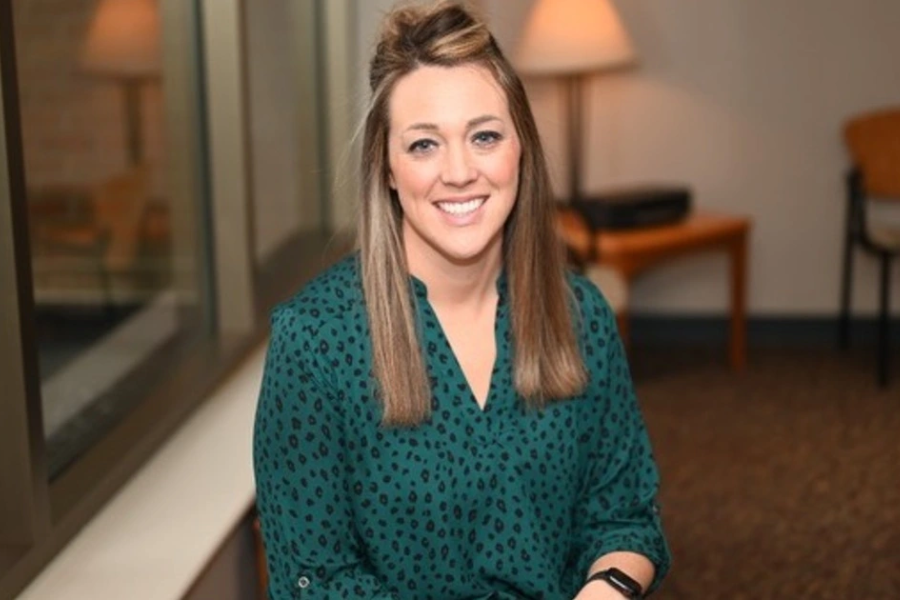The story of Natasha Mae Fester is one that captures the heart and showcases incredible resilience. One unexpected moment changed her life forever, affecting not just Natasha but everyone around her. Join us as we unravel the events that led to this devastating accident and explore the deep and lasting impact it had on Natasha and her loved ones.
Natasha Mae Fester Life And Legacy
Natasha Mae Fester was a devoted mother to her four children: Mason, Marshel, Maxton, and MaKinlee. She was married to Matthew Fester, and together they created a life brimming with love, laughter, and adventure. Natasha’s love for her family was unwavering; she dedicated her life to nurturing and caring for them with boundless devotion.
Beyond her role as a loving mother and wife, Natasha was a gifted nurse practitioner. In August 2023, she earned her Psychiatric Mental Health Nurse Practitioner degree from the University of North Dakota. By November 2023, she had started working at CentraCare Rice Memorial Hospital. Her patients adored her for her compassion and empathy, qualities that made her an exceptional caregiver.
Natasha’s zest for life was reflected in her many passions. She was an avid reader, a talented cook, and a committed runner. Her infectious laughter and warm smile could light up any room, and her presence was a blessing to everyone who knew her.
The Events Leading Up To The Accident
The events leading up to the accident in Natasha Mae Fester’s life unfolded gradually, like a series of unfortunate coincidences aligning against her. It began on what seemed like an ordinary day – Natasha was rushing through her morning routine, trying to balance her work and family responsibilities. Little did she know that this day would change her life forever.
As she hurriedly drove to pick up her children from school, her mind was a whirlwind of thoughts. In a moment of distraction, fate intervened with an unexpected obstacle on the road. The split-second decision she made in that critical moment set off a chain reaction of events beyond anyone’s control. The collision was unavoidable, but its aftermath was anything but predictable.
Thus began Natasha’s journey of healing and recovery, amidst the chaos and uncertainty that followed.
Ripple Effects On Natasha And Her Loved Ones
The accident profoundly impacted not only Natasha Mae Fester but also her family and friends. Natasha faced significant physical and emotional challenges as she tried to rebuild her life.
Her loved ones stood by her, offering unwavering support and love during this difficult time. They too felt the weight of the accident’s repercussions, gaining a new understanding of life’s fragility and their shared connection with Natasha. The incident led them to reassess their priorities, fostering a deeper appreciation for each moment and strengthening their collective resilience in the face of adversity.
Insights And Transformations Post-Accident
In the aftermath of Natasha Mae Fester’s accident, several vital lessons emerged, bringing about significant changes in perspective and priorities. The incident highlighted the fragility of life and the importance of cherishing every moment. It led to a reevaluation of choices, focusing on safety, well-being, and nurturing meaningful relationships.
The accident fostered a greater awareness of taking informed risks and the necessity of being prepared for the unexpected. It emphasized the value of support networks and the need to build resilience during tough times. As a result, Natasha and her loved ones committed to living more intentionally, seizing opportunities for growth, and advocating for improved safety measures in their daily lives.
Psychological Aftermath Of The Accident
The psychological impact of the accident on Natasha Mae Fester was profound. The trauma left deep emotional scars, with anxiety and fear becoming constant companions. She endured haunting flashbacks and sleepless nights filled with dread.
Simple daily tasks became overwhelming as Natasha grappled with feelings of helplessness and vulnerability. Once vibrant and outgoing, she found herself withdrawn, struggling to reconnect with those around her. Seeking professional help was a crucial step in her healing journey. Therapy provided a safe space for her to process her emotions, gradually easing the burden on her mental health. With time and support from her loved ones, Natasha began to see glimmers of hope and a path forward.
Strategies And Support Systems For Recovery
Coping mechanisms and strong support systems were crucial for Natasha Mae Fester and her family following the accident. Therapy sessions became a cornerstone of Natasha’s recovery, giving her a space to express and work through her trauma. Meditation and mindfulness practices also played a key role in helping her find peace amid the turmoil.
Her family and friends provided invaluable emotional support, offering a steady presence and a listening ear. Group counseling sessions allowed Natasha and her family to connect with others who had experienced similar tragedies, fostering a sense of community and shared understanding.
Setting boundaries with media coverage and taking breaks from social media helped reduce triggers that could worsen her anxiety. Creating a safe, comforting space at home provided a refuge during overwhelming moments. Professional mental health support equipped Natasha and her family with tools to build resilience and foster healing.
Promoting Road Safety In Natasha’s Memory
While we can’t bring back Natasha’s vibrant life, we can honor her memory by striving to create a safer world. Raising awareness about road safety and preventing car accidents is crucial in recognizing Natasha’s loss and protecting our loved ones from similar tragedies. Here are a few essential tips to promote road safety:
Observe Speed Limits
Speeding is a leading cause of road accidents. Always adhere to speed limits and adjust your speed according to current conditions to ensure safe driving.
Avoid Distractions
Distracted driving, such as using a cell phone or eating while driving, significantly increases the risk of an accident. Stay focused on the road and avoid unnecessary risks.
Wear Seat Belts
Seat belts save lives. Make sure everyone in the vehicle wears a seat belt, regardless of their seating position.
Never Drive Under The Influence
Alcohol or drugs can impair your ability to drive safely. Always avoid driving under the influence and seek assistance from a sober driver if needed.
Follow Traffic Signals
Obey all traffic signals and signs, and be mindful of other vehicles and pedestrians around you.
Maintain Your Vehicle
Regularly maintain your vehicle to ensure it is in good condition. Properly functioning brakes, tires, and lights are essential for safe driving.
Educate Young Drivers
Teach young, inexperienced drivers safe driving habits from the start. Ensure they understand the importance of responsible driving.
The Role Of Mental Health In Accidents
Understanding the role of mental health in accidents is crucial. Mental well-being can affect decision-making, reaction times, and overall safety on the road. Stress, anxiety, or depression can impair judgment and increase the likelihood of errors while driving. It’s important to recognize that mental health issues may not always be visible but can significantly impact one’s ability to stay focused behind the wheel.
Taking care of our mental health is just as important as our physical health in preventing accidents. Seeking help if you’re struggling with emotional challenges can greatly improve safety on the road. By addressing mental health concerns proactively, we can create a safer environment for ourselves and others on the streets.
Prioritizing mental well-being isn’t just about personal wellness; it’s also a responsibility to those around us. Let’s raise awareness about the link between mental health and accidents to promote safer driving habits for everyone sharing the roads.
Steps Taken To Prevent Similar Accidents
In light of Natasha Mae Fester’s tragic accident, it’s crucial to discuss steps for preventing similar incidents in the future. One vital measure is prioritizing mental health awareness and support for those facing challenges. Encouraging open communication and removing the stigma around seeking help can make a real difference.
Additionally, implementing strict safety protocols and training programs in high-risk environments can improve overall safety standards. Regular equipment and vehicle inspections and maintenance checks are essential to ensure they function properly. Educating individuals on responsible decision-making when operating machinery or participating in activities can help reduce potential risks.
Collaboration between authorities, organizations, and communities is essential in fostering a culture of safety and accountability. By working together to identify hazards, address concerns promptly, and consistently enforce regulations, we can actively reduce the likelihood of accidents. Reflecting on Natasha Mae Fester’s story serves as a poignant reminder of the importance of proactive prevention measures moving forward.
Natasha Fester Obituary
Natasha Mae Fester, aged 33, tragically passed away on Wednesday, March 13, 2024, at her residence in Grove City. Her Mass of Christian Burial is scheduled for 11:00 am on Monday, March 18th, at the Church of St. Mary in Willmar. A visitation will be held from 2-5:00 pm on Sunday at Harvey Anderson Funeral Home in Willmar, continuing one hour before her service at the church. Memorials in her honor are preferred to the “Fester children.” Natasha’s arrangements are being handled by Harvey Anderson Funeral Home in Willmar, available at www.hafh.org.
FAQs:
Q. What are some signs that mental health issues may be affecting someone’s ability to drive safely?
Signs may include increased stress or anxiety, difficulty concentrating, changes in mood or behavior, and feelings of fatigue or exhaustion.
Q. How can individuals support someone who may be struggling with mental health challenges related to driving?
Encourage open communication, offer support and understanding, and help them seek professional help if needed. Avoid judgment and provide reassurance that seeking help is a sign of strength.
Q. What can organizations and communities do to promote mental health awareness and support for safer driving?
Provide education and resources on mental health, offer employee assistance programs, and promote a culture of support and understanding. Collaborate with mental health professionals and community organizations to offer accessible support services.
Conclusion
Natasha Mae Fester’s story serves as a poignant reminder of the importance of addressing mental health in the context of road safety. By prioritizing mental health awareness, supporting individuals facing challenges, implementing strict safety protocols, and fostering collaboration between authorities, organizations, and communities, we can work towards preventing similar tragedies in the future. Together, we can create a safer environment for everyone on the roads, ensuring that no family has to endure the pain and loss experienced by Natasha Mae Fester and her loved ones.




